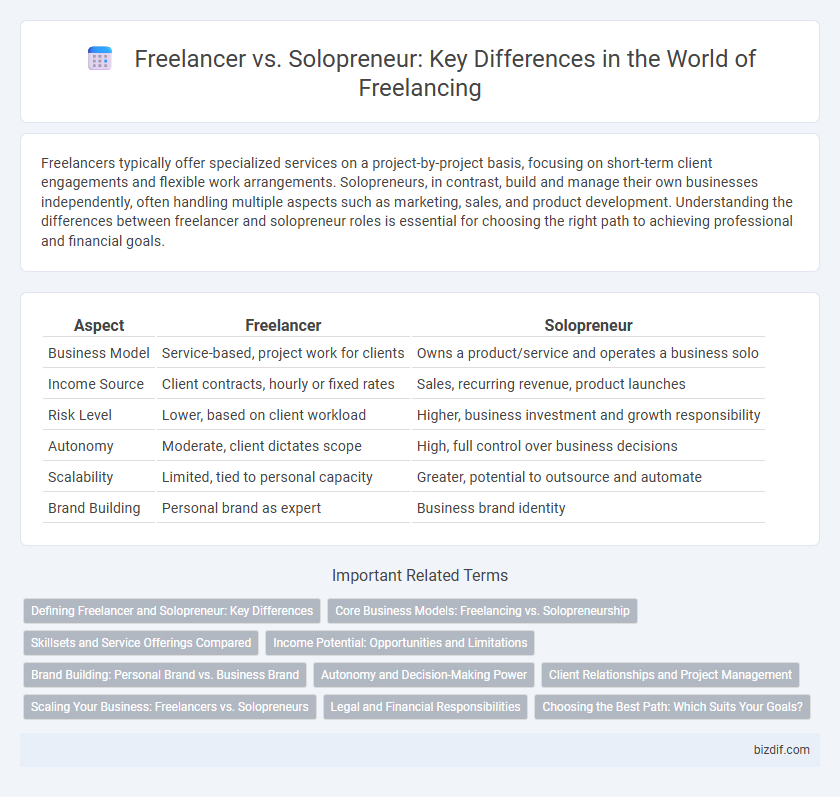Freelancers typically offer specialized services on a project-by-project basis, focusing on short-term client engagements and flexible work arrangements. Solopreneurs, in contrast, build and manage their own businesses independently, often handling multiple aspects such as marketing, sales, and product development. Understanding the differences between freelancer and solopreneur roles is essential for choosing the right path to achieving professional and financial goals.
Table of Comparison
| Aspect | Freelancer | Solopreneur |
|---|---|---|
| Business Model | Service-based, project work for clients | Owns a product/service and operates a business solo |
| Income Source | Client contracts, hourly or fixed rates | Sales, recurring revenue, product launches |
| Risk Level | Lower, based on client workload | Higher, business investment and growth responsibility |
| Autonomy | Moderate, client dictates scope | High, full control over business decisions |
| Scalability | Limited, tied to personal capacity | Greater, potential to outsource and automate |
| Brand Building | Personal brand as expert | Business brand identity |
Defining Freelancer and Solopreneur: Key Differences
A freelancer provides specialized services on a project-by-project basis, often working with multiple clients without long-term commitments. A solopreneur operates their own independent business, assuming full responsibility for all aspects of the enterprise, from strategy to execution. The key difference lies in the solopreneur's ownership and control over the business, while freelancers are primarily service providers without entrepreneurial infrastructure.
Core Business Models: Freelancing vs. Solopreneurship
Freelancers typically operate by offering specialized skills or services on a project basis, focusing on client-driven work with flexible contracts. Solopreneurs build and scale their own business model, often creating products or systems that generate recurring revenue independently of direct client engagement. The core business model distinction lies in freelancers trading time for money, while solopreneurs aim to develop sustainable, self-managed businesses.
Skillsets and Service Offerings Compared
Freelancers typically specialize in specific skillsets such as graphic design, content writing, or web development, offering targeted services to clients on a project-by-project basis. Solopreneurs combine diverse skills like marketing, sales, and product development to create and manage a full business model, providing comprehensive service offerings beyond individual tasks. The difference in service scope reflects freelancers' focus on execution versus solopreneurs' strategic approach to building scalable ventures.
Income Potential: Opportunities and Limitations
Freelancers often face fluctuating income due to project-based work and client dependency, limiting long-term financial stability. Solopreneurs can create scalable income streams by developing products or services beyond client hours, offering higher earning potential. However, solopreneurs assume greater risk and responsibility, balancing growth opportunities with operational challenges.
Brand Building: Personal Brand vs. Business Brand
Freelancers primarily build a personal brand centered on their individual skills and reputation, directly linking their identity to their services. Solopreneurs develop a business brand that extends beyond their personal identity, creating an entity that can scale, attract clients, and potentially operate independently. Effective brand building for solopreneurs involves strategic marketing, consistent messaging, and establishing a unique value proposition distinct from the founder's personal persona.
Autonomy and Decision-Making Power
Freelancers typically have autonomy in choosing projects but often work under client guidelines, limiting their decision-making power. Solopreneurs exercise complete control over business strategies, branding, and client selection, maximizing their autonomy and influence on outcomes. This distinction highlights solopreneurs' broader scope of independent decision-making compared to freelancers' project-specific freedom.
Client Relationships and Project Management
Freelancers typically juggle multiple client relationships with varying scopes, requiring flexible project management to meet diverse deadlines and expectations. Solopreneurs, on the other hand, cultivate deeper, long-term client partnerships by overseeing entire business operations, allowing for more strategic project planning and consistent branding efforts. Effective communication and tailored service delivery are key to sustaining client trust and optimizing project outcomes in both roles.
Scaling Your Business: Freelancers vs. Solopreneurs
Freelancers often face limitations in scaling due to dependence on individual capacity and project volume, whereas solopreneurs can leverage systems, automation, and outsourcing to expand business operations and revenue streams. Solopreneurs typically build scalable models by developing proprietary products or services, enabling passive income alongside active client work. Strategic delegation and business infrastructure are key differentiators allowing solopreneurs to surpass traditional freelancer growth ceilings.
Legal and Financial Responsibilities
Freelancers typically operate as independent contractors, managing their own taxes and invoicing without forming a formal business entity, which limits their legal protections. Solopreneurs often establish registered businesses, such as LLCs or sole proprietorships, providing increased liability protection and more structured financial accounting. Legal responsibilities for solopreneurs include business licenses and compliance with local regulations, while financial tasks encompass payroll and potential employee benefits not usually required for freelancers.
Choosing the Best Path: Which Suits Your Goals?
Freelancers focus on offering specific skills or services on a project basis, ideal for those seeking flexibility and diverse clients. Solopreneurs build a personal brand and business, often creating scalable products or services aligned with long-term growth goals. Evaluating your priorities--immediate income versus business development--helps determine whether freelancing or solopreneurship best aligns with your career objectives.
freelancer vs solopreneur Infographic

 bizdif.com
bizdif.com